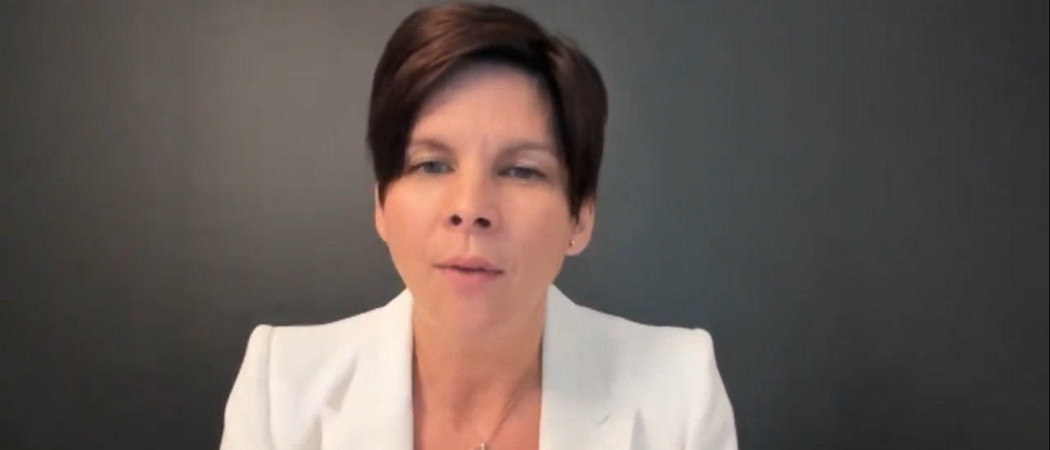But pandemic not sufficient reason to rip up green and digital research plans, executives say at Science|Business conference

Sandra Bour Schaeffer, head of Airbus demonstrators and CEO of Airbus UpNext, at the Science|Business conference "Industrial R&D: Europe First?". Photo: Science|Business.
The COVID-19 pandemic has upended commercial aviation, but industry executives still see the need to push on with large-scale research projects if Europe is to remain competitive in global aircraft markets.
“We were heading to a very important transition before COVID,” said Sandra Bour Schaeffer, head of Airbus demonstrators and CEO of Airbus UpNext, the aviation group’s innovation lab. With Airbus planning to roll out a zero-emission aircraft by 2035, “We need to continue on that path,” she says, making a call to the European Commission to “maintain funding” for aerospace in the next big EU research programme, Horizon Europe.
Other executives, speaking at a Science|Business event on September 8, concurred – adding that unless Europe pushes ahead with long-term R&D it risks losing talent and standing in global markets.
The worldwide economic downturn heightens the risk of expertise – for instance in helicopter development – leaking out of Europe, or going on the market for cheap, said Giorgio Gulienetti, head of research and development at Leonardo, Italy's largest defence and aerospace company.
“Rotorcraft expertise is something we have; but in the medium to long term, it may be taken away from us. We’re not innovating in Europe with local supply chains, with local capabilities. COVID has shown… that Europe has to be able to maintain leadership in strategic areas,” he said.
The EU’s growing willingness to challenge US and Chinese dominance in strategic parts of the economy is a good pursuit, said Schaeffer, provided it doesn’t result in rules that are “too directive” for companies. Brussels’ push on “technological sovereignty” follows the concern in European capitals that the EU will be weakened by the market dominance of the big international companies, particularly in areas like storing and analysing data, and battery and medical supply development.
Joeri De Ruytter, ambassador for R&T business development and partnerships at aerospace giant Honeywell, said the crisis has exposed the industry’s supply chain gaps, but has also allowed politicians and industry to reappraise the continent’s strategic strong points. “Sometimes it needs to be dark before you see the stars,” he said.
Clean sky still needed
Despite the throttling the virus has given the sector this year, “Our objectives on green and digital shouldn’t change,” said Gulienetti.
Leonardo sits alongside Airbus, Honeywell and the other big names in European aerospace industry in the EU’s €4 billion Clean Sky research project, which goes into a new phase in January 2021. This EU-backed public-private partnership aims to build lighter, more environmentally friendly planes.
Gulienetti explained that technology development timelines are very long in aerospace, meaning plans already underway should continue. “The industry is very conservative – things are developed, tested and tested again. What we start in 2021 will be implemented 10 years later,” he said.
There will still be a market for the clean engine innovations that come out of the programme, even if the commercial airline sector shrinks after COVID, said Honeywell’s De Ruytter. “There’s a good set of eyes in the Commission and industry that look at PPPs (public-private partnerships). There’s no way these things can’t deliver,” he said.
Yet Guilienetti is concerned that Commission officials could tweak the project in ways that make it less attractive for future industry participation.
“What the hell are you doing with all the rules? I think we found a balance in (the current programme) Horizon 2020. Someone said we can do better for Horizon Europe,” he said.
The Italian urged politicians in Brussels to stick with what has worked in the past, rather than wrapping the programme with fresh red tape.





 A unique international forum for public research organisations and companies to connect their external engagement with strategic interests around their R&D system.
A unique international forum for public research organisations and companies to connect their external engagement with strategic interests around their R&D system.